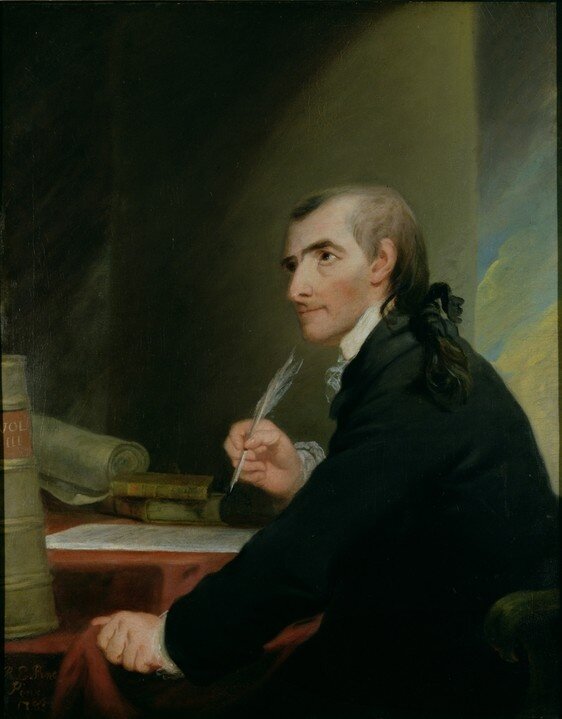
Francis Hopkinson
New Jersey
On September 21, 1737, Francis Hopkinson was born into a family of great influence. In the Pennsylvania colony, Thomas Hopkinson, his father, was quite eminent in the legal and business worlds. He also made a significant contribution to the educational culture of Philadelphia by helping found, with Benjamin Franklin, the College of Pennsylvania (presently University of Pennsylvania).
Tragically, young Hopkinson’s father died when he was 14 years of age. His mother, Mary Baldwin Johnson, ensured he finished his education. He completed his degree work at the College of Pennsylvania at 16 years of age. Three years later he fulfilled the requirements for an M.A. degree. Then, he read law under the supervision of Benjamin Chew, the attorney general for the colony. He was admitted to the bar in 1761.
From 1757 to 1773, Francis Hopkinson wrote many poems and essays about the fight for freedom. They were widely read and many were presented in allegory. They were quite scathing of the British and loyalists. In 1776, he wrote The Prophecy, which predicted the adoption of the Declaration of Independence before it occurred. He eventually became one of the best-known writers in the United States after the war.
Other writings of Mr. Hopkinson reveal his great devotion and adherence to the truths of the Christian faith. In the essay, “On Adversity,” he wrote, “When we find that the pleasures of the world cannot give solid, permanent satisfaction— cannot gratify all our desires, we are induced to turn to that only Being who is the source of true felicity, and in whom alone there is fulness of joy. In the time of distress we feel and know what we only had, perhaps, a transient idea of before, that the Christian graces and virtues are the only true sources of happiness; and will be our comfort in the last inevitable hour …”
Francis Hopkinson’s first job was being a secretary to the provincial council of the Pennsylvania Indian Commission. He helped draft the treaties with the Delaware and Iroquois tribes. His attempts, however, to begin a law practice were not fruitful as was a business venture he pursued. Following this, he sailed for England where he hoped friends and relatives might be able to connect him with the right people and yield an opportunity. He had no success and returned to America in August of 1767.
Upon returning, Francis Hopkinson met Ann Borden, daughter of Colonel Joseph Borden and Elizabeth Rogers. They married on September 1, 1768. Over the next few years, he became a customs collector and an assemblyman for the New Jersey royal provincial council. He was also admitted to the bar in New Jersey. In 1776, he resigned from his royal appointments and was elected a New Jersey delegate to the Second Continental Congress. He only served in Congress for four months. During that time, he voted for independence and signed the Declaration of Independence.
Francis Hopkinson went back to his law practice and he served his state through a number of positions. For instance, he was the treasurer for the Continental Loan Office in 1778. He also received several appointments as judge of the Admiralty Court of Pennsylvania. He, however, was known more for his contributions to America’s culture during his lifetime than he was for his public service. He produced works of music, art, and literature. He created two musical compositions that are most notable: “My Days Have Been So Wonderous Free,” the first American composition of secular music, and the first opera composed by an American, “Temple of Minerva.” A ballad, however, was his most popular, “The Battle of the Kegs.”
Francis Hopkinson’s skilled wisdom on the bench was honored by President Washington in 1789. He was commissioned judge of the United States District Court for the Eastern District of Pennsylvania on September 26th. He was not even in this position for two years before tragedy struck him. He suffered a deadly epileptic seizure and passed away on May 9, 1791.
Francis Hopkinson lived to be 53 years of age.


